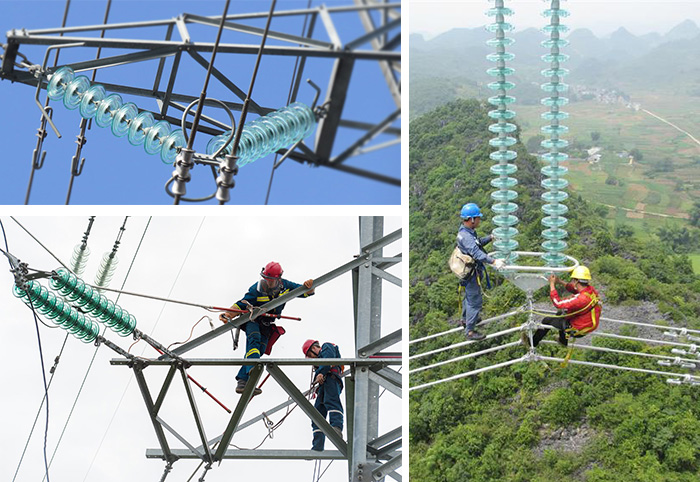
Performance of Glass Insulators
2023-04-19 20:49There are two basic functions of glass insulators in overhead transmission lines, supporting the conductors and preventing current from returning to the ground. During the operating life of the entire line (usually 40 years), these two functions must be guaranteed, and the insulators should not fail due to various electro-mechanical stresses caused by changes in environmental and electrical load conditions. In addition to the weight of the wire and metal accessories, the mechanical load on the insulator must also bear the wind load, snow load, wire galloping under severe weather conditions, and the impact load caused by improper operation during transportation and installation. From an electrical point of view, the insulator must not only insulate the wire from the ground, but also must withstand the over-voltage impact caused by lightning and switching operations. When a flashover occurs due to a voltage impact, the local overheating caused by the insulator should not cause the insulator to burst. . All external factors will affect the performance of insulators, therefore, higher requirements are also put forward for the design of insulators.

Excellent dielectric properties and no aging phenomenon
Dielectric properties refer to the electrical properties of a medium under the action of an electric field. The insulation performance of an insulator has a lot to do with the internal molecular structure of the insulating material. Glass is an amorphous structure, a silicate compound with no fixed melting point, dense structure and uniform texture, produced in an easy-to-control continuous production process. SiO2 is the skeleton of glass, and other oxides are filled in the skeleton and connected by chemical bonds. It has a large interaction and is not easily polarized by an electric field. It shows good inertia and is an ideal insulating material. Toughened glass insulators take advantage of this feature, and their lightning impulse withstand voltage value is 3.8 times that of porcelain insulators. The aging mentioned here refers to the electrical performance aging, that is, the medium will gradually undergo some physical and chemical changes under the long-term action of the electric field, which will cause the irreversible deterioration of the medium, and eventually lead to the breakdown of the medium. The toughened glass insulator has good anti-aging performance. According to the follow-up test of the insulator of the 132kV transmission line in Malaysia after 27 years of operation by the French Sediver Company, its mechanical and electrical properties have not changed significantly. However, the electro-mechanical performance of the porcelain insulators used in the same period decreased significantly after running for a period of time.
Toughened glass insulators have the characteristics of zero-value self-breaking and easy detection. In actual use, they can fully demonstrate good performance advantages, perform good functions and functions, and toughened glass insulators have zero-value self-breaking characteristics. It only needs to be observed on the ground or on the helicopter, and there is no need to board the pole to inspect the pieces one by one, which reduces the labor intensity of the workers. The insulator is a product imported from the production line, with an annual self-breaking rate of 0.02-0.04%, which can save the maintenance cost of the line, has good arc resistance and vibration resistance, and plays an important role and value in the power industry.
The new surface of the glass insulator suffered from lightning burns during operation is still a smooth glass body with a toughened internal stress protection layer, so it still maintains sufficient insulation properties and mechanical strength. Galloping disasters caused by wire walking on ice have occurred many times on the 500kv line. After testing, the electro-mechanical performance of the glass insulators subjected to the galloping of the wires has not been attenuated. Types of toughened glass insulators: standard type, pollution-resistant type, DC type, spherical type, aerodynamic type, ground wire type, and for electrified railway. Different types show important functions and values in actual use.
Advantages of glass insulators: If the glass body of the insulator has various defects, the glass body will automatically break, which is called "self-breaking". After the insulator breaks itself, the iron cap residual hammer still maintains a certain mechanical strength and hangs on the line, and the line can still continue to run. When the line inspector inspects the line, it is easy to find the self-breaking insulator and replace it with a new insulator in time. Since glass insulators have this "self-breaking" feature, there is no need to conduct preventive tests on insulators during line operation, which brings great convenience to the operation.
